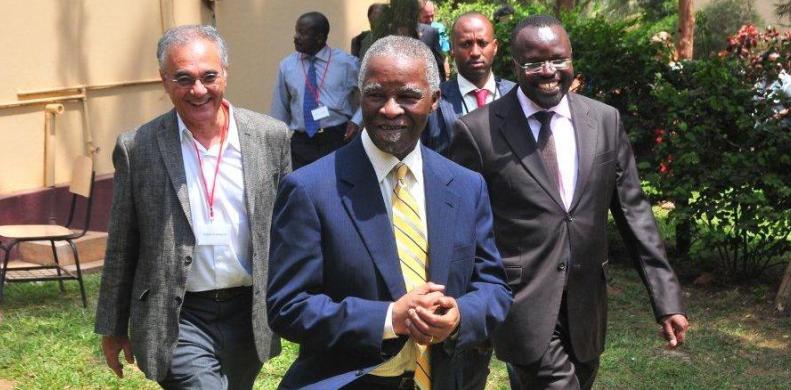Conference Concept Note:
Are there competing visions for a post-Cold War Africa? And, indeed, competing institutions and competing powers that seek to put those competing visions in place?
There is new urgency to these questions, as a string of internal crises has given rise to an array of African and external interventions in places as far apart as Libya and Ivory Coast, Darfur, South Sudan, and Kenya's Rift Valley, and Northern Uganda and Somalia.
A key aspect of these interventions is the "Responsibility to Protect" doctrine which, in the decade since its inception, has become the primary paradigm through which political violence in Africa is viewed and responded to by the UN and by dominant Western powers. R2P informs the agenda of the ICC, provides a rationale for Western intervention in Africa—most dramatically the NATO-led military interventions in Ivory Coast and Libya—and has been lauded as a new normative foundation for Africa's own peace and security architecture.
Bitter controversy has accompanied the doctrine's precipitous rise. Questions surround what Africa's priority should be in today's era: political reform, economic development, or security, narrowly construed? Did R2P and the ICC emerge from Africa's own historical experience with conflict resolution and conflict prevention, or do these institutions threaten to bring the era of African independence to a close? Has not the African Union already internalized R2P as a principle and doctrine, evidenced by Article 4 of its Constitutive Act which provides the AU with the right to intervene in African states' internal affairs, thus rendering external intervention illegitimate and unnecessary?
African states have voted for and signed on to resolutions and treaties that form the building blocks of an international architecture oriented around R2P. Yet they have also been among the first and loudest to dissent from its practical application. What is the relationship between global, continental, and national initiatives? When does one displace the other, and when is the relationship complementary and reinforcing?
The contests around the future architecture of Africa's post-Cold War relations provide the framework within which two different but related kinds of alignments are taking place. The first is the international contest over Africa between dominant Western powers and emerging powers such as China and India. It is also the context within which African states are beginning to re-align: Is there an emerging political divide within the African continent reminiscent of the 'Monrovia-Casablanca' blocs of the Cold War era?
Given Africa's centrality to the architecture of the emerging post-Cold War era, there is need for independent debate on these questions. As a contribution to this debate, the Makerere Institute of Social Research is proposing a two-day workshop. We aim to bring together academics and policy-makers to reflect on both principle and practice and to situate this discussion in its larger context, both historical and contemporary.
The conference will focus on a set of relationships and experiences:
- The dialectic between internal reform and external intervention;
- The implications for Africa of the ongoing conflict between old hegemonic and newly emergent global powers;
- Lessons to be drawn from key African experiences:
(a) Internal settlements (South Africa, Mozambique);
(b) compromised elections, political violence and divergent outcomes (Kenya, Zimbabwe, Ivory Coast);
(c) African interventions (Somalia);
(d) US intervention with allied support (Northern Uganda, the region, and the LRA); and
(e) unilateral Western intervention (Libya, Ivory Coast).
Speakers and Themes:
Western Intervention: The Latest Phase
Makau Mutua, The State University of New York at Buffalo
Siba Grovogui, Johns Hopkins University
Africa and the New International Political Order
Adam Branch, MISR & San Diego State University
Ronald C. Jennings, London School of Economics
Case 1: Kenya
Betty Murungi, Founding Director, Urgent Action Fund - Africa
L. Muthoni Wanyeki, Sciences Po, Paris
Case 2: Somalia
Alex de Waal, World Peace Foundation, Tufts University
Abdi Samatar, University of Minnesota
Case 3: Zimbabwe
Brian Raftopoulos, Solidarity Peace Trust
Paris Yeros, Pontifical Catholic University of Minas Gerais
Law, Violence, and Order
Mahmood Mamdani, Makerere Institute of Social Research
Press Coverage:
Thabo Mbeki speaks on African Problems: "Ugandans shouldn't wait for AU to teach them how to manage oil" ---Click here to read the report from Sunday Monitor.
Strengthen AU to Resist Foreign Intervention, Mbeki urges Africans ---Click here to read the report from Daily Monitor.
Mbeki: Africa Still in Crisis ---Click here to read the report from Daily Monitor.
Anti-gay Bill doesn't make Sense, says Mbeki ---Click here to read the report from Daily Monitor.
Mbeki advises on Good Governance ---Click here to read the report from The New Vision.
Mbeki's message: To every Action there is a Reaction --- Click here to read the report from Daily Monitor.
Makerere hosts Mbeki for high-level Africa Discourse ---Click here to read the report from Daily Monitor.


